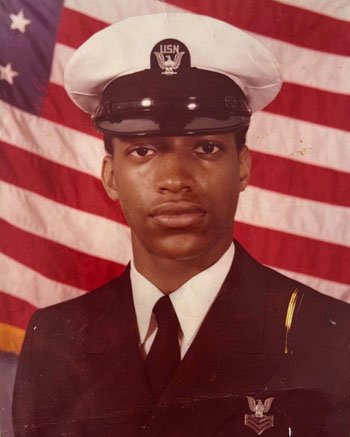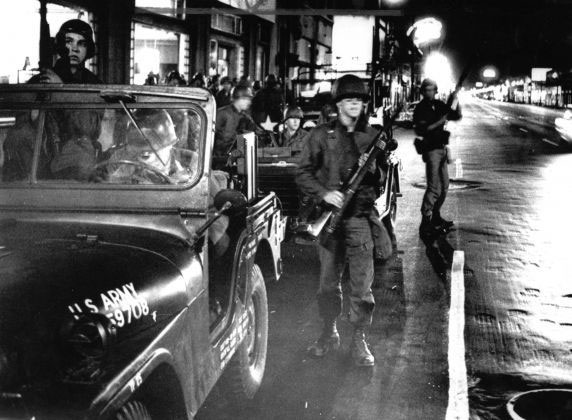At Six, He Stared Down the Muzzle of a Tank. In Prison, He Faced His Biggest Enemy
Editor’s Note: This story was published in partnership with San Quentin News and was written during a writing seminar for incarcerated veterans in April hosted by The War Horse at California’s San Quentin Rehabilitation Center. Tens of thousands of military veterans are incarcerated across the United States, and these stories are intended to shine a light on their unique needs, challenges, and experiences. Learn about the seminar here.
I stood on the porch of my mother’s three-level home in shorts and a pair of tennis shoes. It was sunny and warm, the kind of day that required no shirt for a boy like me, and one I might have enjoyed if not for a tank that had just turned its gun turret toward my home.
I crouched into a boxer’s stance, fists raised, ready to fight to defend myself and my family. Only a six-year-old can stare down the muzzle of a weapon of destruction and think he can win.
I was not a child lost in his daydreams. This is what happened in 1967 in what was known as Detroit’s “inner city.”
The National Guard had been called in to put down a riot of such duration (five days) and violence that only armored vehicles could safely travel down streets and protect people and property against total loss.
Yet, at age six, all I knew was that the only world I knew was under siege. I needed to do something, but I couldn’t. Standing on the porch, that need dug its way deep inside of me until one day it materialized in the image of my father: A six-foot-two, 245-pound man known by Detroiters as The Beast.
My father worked as the enforcer of an organization that controlled the distribution of heroin throughout Detroit’s east side, meaning he did things our family had no knowledge of. He always said, “You don’t shit where you eat,” which is maybe why he chose a woman who lived on the other side of Detroit.
Besides, my mother’s cooking was known to be able to “tame any beast.” Lillian Lee Robinson had migrated to Detroit from Yazoo, Mississippi , in search of a better life. Motor City, home to Ford Motor Company, promised just that. (Yet by 1967, the automobile industry had cut jobs, leaving it a shell of its former self.)
The city suited her early on. She fit right into the hustle and bustle of Motor City with her downhome hospitality and her willingness to cook a meal or throw a party. Her greatest strength, I believed, was in bringing out the best in people.
One December morning, I went around the neighborhood shoveling snow for extra money. When I got home, my mother asked me for half my earnings. I protested—it was my money after all. She calmly explained to me that I had to help feed the family. I grumbled all day. Then at dinnertime, my mother served me herself—thanking me for helping make the meal possible.
I stuck out my little chest with pride.
Throughout the years, my employers knew me as a man who needed a job to help feed his family. I might have been a fool, but I was a hardworking fool.
Award-Winning Journalism in Your Inbox
My mother taught me that whatever you do, do it to the best of your ability. She taught me never to call another man your friend until you see how he acts around money, women, and alcohol.
But her love and guidance did not stop me from getting into violent fights with teenagers—and grown men. Hoping to save me from myself, she made a decision for my future.

Regal Robinson served in the U.S. Navy from 1977 to 1980. (Photo courtesy of the author)
Not long after my 17th birthday, I returned home from a long day shoveling gravel on a construction job. After a nice shower, I came downstairs to a full-course meal that included hot apple turnovers for dessert. My mother had made them from scratch, flattening the dough with a rolling pin, cutting apples into small pieces, and heating cinnamon, butter, and sugar together to produce a nice glaze for the pastry.
I was in heaven, enjoying all the flavors and layers of the meal. I couldn’t stop smiling. After I finished, my mother came over to me and asked how everything tasted.
I couldn’t speak. I just wrapped my arms around her and rested my head against her. That feeling of comfort lasted only for a moment. I opened my eyes. My mother had grabbed me up from my seat. She marched me down to the recruiting office. When we arrived, she reached her hands up to my face.
“You like to fight?” she asked me. “Why not fight for the right reasons?”
I joined the U.S. Navy on Dec. 19, 1977.
My time in the military was a whirlwind. As we pulled into ports all around the world, I imagined myself as Genghis Khan. My helo squadron knew me as a hard worker. Marines, who would come to the Navy barracks and get me for nights out on the town, knew me as a good fighter.
I received an honorable discharge in 1980. I flew out to Virginia, then to my duty station in San Diego, then home. The Beast’s son had just arrived. At 20, I was reckless, undisciplined (in life but not work), and a fighting machine. I was trained in Isshin-ryū, a style of Okinawan karate that was right up my alley.
Our Journalism Depends on Your Support
Eventually, I returned to San Diego, where my behavior brought me to the attention of an area drug dealer. I was one of his enforcers and indulged in every whim. Needless to say, my lifestyle led me to prison in a pattern that kept me coming back.
I have spent over half of my life in prison. And now, I wouldn’t change it for the world.

Federal troops in Detroit in 1967. (Photo courtesy of Walter P. Reuther Library, Archives of Labor and Urban Affairs)
You see, I finally listened to that little boy who stood in front of a tank and believed he had the power to do something.
I told you I was a good fighter. I admitted to myself that I was a fool and stopped being one. I admitted that I was broken and worked to fix it. These might sound like pretty words, but there’s nothing pretty about me.
I faced my biggest enemy—myself—and won.
This War Horse reflection was edited by Kristin Davis, fact-checked by Jess Rohan, and copy-edited by Mitchell Hansen-Dewar. Hrisanthi Pickett wrote the headlines.





Comments are closed.